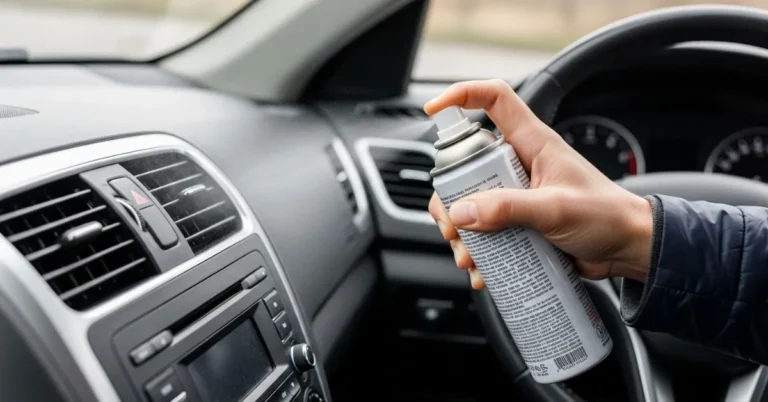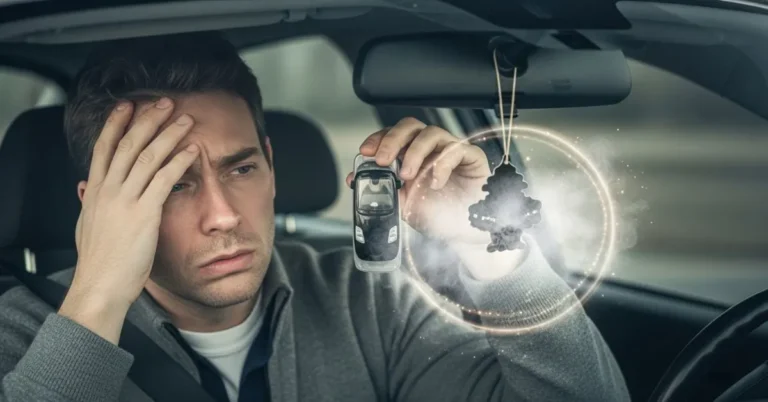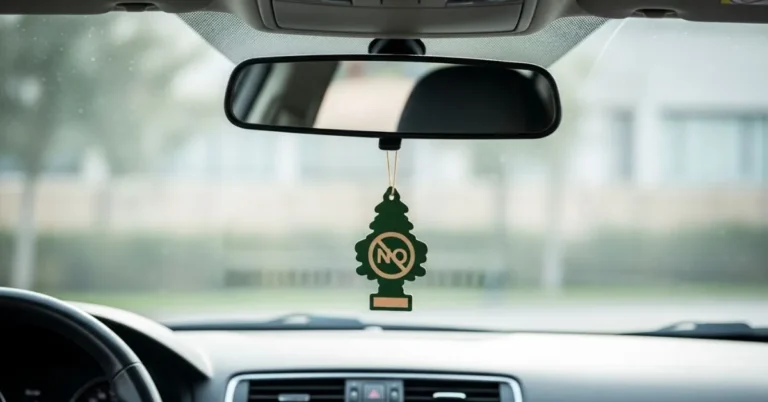
Are car air fresheners bad for dogs? It was one of those golden Saturday mornings when everything felt fresh, except Jenna’s car. She’d spent the past week chauffeuring her Labrador, Max, from the park to the vet to the groomer, and her SUV now smelled like a mix of wet fur, stale French fries, and something suspiciously like gym socks.
Determined to fix it, she vacuumed every inch, wiped the dashboard until it gleamed, and finally hung a brand-new “Ocean Breeze” air freshener from the rearview mirror. The scent hit her nose like a tropical wave. “Perfect,” she thought, picturing a breezy, odor-free drive.
But Max had other ideas. The moment his paws hit the backseat, he froze. One sniff, two sneezes, a confused head tilt — and then he turned toward Jenna with an expression that could only mean: “What on earth have you done to my car?”
By the time they reached the park, Max was licking his lips nervously, sneezing every few minutes. That’s when Jenna’s excitement shifted to concern. Could her effort to freshen the car be making her dog sick? And if so, could it also be affecting her health?
More and more pet owners are asking the question: Are car air fresheners bad for dogs and the humans who ride with them?
Let’s find out.
Contents
- 1 1. The Nose Knows: Why Dogs Smell Danger Before We Do
- 1.1 2. What’s Hiding Inside Car Air Fresheners
- 1.2 3. Are Car Air Fresheners Bad for Dogs? The Veterinary View
- 1.3 4. Humans Aren’t Immune Either
- 1.4 5. The “New Car Smell” Isn’t What You Think
- 1.5 6. Pet-Friendly Ways to Keep Your Car Fresh
- 1.6 7. The Rise of Eco-Friendly & Sustainable Fresheners
- 1.7 8. Spotting the Signs Your Dog’s Had Enough
- 1.8 9. Keeping Your Car Fresh Without Chemicals
- 1.9 FAQs
- 1.10 Expert Thoughts: Fresh Air, Happy Pup, Healthy You
- 1.11 About the Author
1. The Nose Knows: Why Dogs Smell Danger Before We Do
Dogs experience life through their noses. While we humans have around 5 million scent receptors, our canine companions boast a staggering 300 million. And when it comes to brain power for smelling, their olfactory bulb the section dedicated to processing scent is about 40 times bigger than ours.
- The “mild” lavender vent clip you think smells pleasant might hit your dog like standing inside a perfume factory.
- Even a small amount of a chemical compound can overwhelm their senses.
- Dogs process smells with a layer of emotional and instinctive memory, meaning a scent that feels “harsh” or “chemical” can trigger stress.
For a dog, your car is already an enclosed box of smells: perfume, shampoo, the seats, the road dust, traces of last week’s drive-thru trip. A potent air freshener on top can turn the ride into sensory overload.
2. What’s Hiding Inside Car Air Fresheners
Whether it’s a cardboard tree dangling from your mirror, a plug-in diffuser, or a scented gel canister under your seat, most conventional air fresheners rely on a similar set of ingredients:
- Volatile Organic Compounds (VOCs): These evaporate at room temperature to release scent. Common VOCs include formaldehyde, benzene, and toluene some known irritants and potential carcinogens.
- Phthalates: Chemicals used to make scents last longer. They’ve been linked to hormone disruption in both humans and animals.
- Synthetic Fragrance Blends: Made from petroleum-based chemicals that can trigger allergies or respiratory irritation.
- Solvents: Help disperse the scent molecules, but can cause headaches or nausea when inhaled for long periods.
The problem? Airflow inside a car is limited. VOCs and other chemicals can build up quickly, making it harder for you and your dog to breathe clean air.
3. Are Car Air Fresheners Bad for Dogs? The Veterinary View
Veterinarians are increasingly cautioning pet owners about fragranced products, especially in small, enclosed areas like cars. Dogs exposed to strong scents may experience:
- Sneezing and coughing from nasal irritation
- Watery or red eyes due to chemical vapors
- Excessive drooling or lip licking as a stress response
- Skin irritation if particles settle on their fur and they groom themselves afterward
- Behavioral changes like restlessness, whining, or even trying to escape the car
Certain groups are at higher risk:
- Puppies (developing respiratory systems)
- Senior dogs (weaker immune systems)
- Brachycephalic breeds like pugs, bulldogs, and shih tzus (short noses make breathing harder)
- Dogs with asthma or allergies
While one brief exposure might cause mild irritation, repeated inhalation over months or years could contribute to more serious respiratory issues.
Read More: Are Air Fresheners Illegal in Cars in the USA?
4. Humans Aren’t Immune Either
We might not sniff the air with the same intensity as dogs, but VOCs and synthetic fragrances can still affect us. Health experts link frequent exposure to air fresheners with:
- Headaches and migraines
- Dizziness or lightheadedness
- Allergic reactions (itchy eyes, runny nose, sneezing)
- Asthma flare-ups
- Endocrine disruption in long-term, high-level exposure
Children, pregnant women, and those with pre-existing respiratory issues are especially sensitive.
So, when you ask, “Are car air fresheners bad for dogs?” you might also be answering the question for yourself.
5. The “New Car Smell” Isn’t What You Think
Many drivers love that “new car smell,” but here’s the reality: it’s not a scent it’s off-gassing.
Off-gassing happens when plastics, adhesives, foams, and fabrics release VOCs over time. That factory-fresh aroma is a chemical cocktail.
Adding another layer of synthetic fragrance over that doesn’t make the air cleaner; it compounds the chemical load.
6. Pet-Friendly Ways to Keep Your Car Fresh
You can have a fresh-smelling car without harming your four-legged passenger. Here are safe, affordable, and dog-friendly options:
- Baking Soda Sachets: Place in a breathable pouch under the seat to absorb odors naturally.
- Activated Charcoal Bags: Long-lasting and non-toxic; absorbs moisture and odor without adding fragrance.
- Pet-Safe Fabric Sprays: Look for unscented, enzyme-based sprays for pet bedding.
- DIY Vinegar Spray: Mix one part vinegar with three parts water; spray lightly on fabric and let dry.
Essential Oil Warning: Some oils like tea tree, peppermint, citrus, eucalyptus are toxic to dogs. If you use essential oils, choose pet-safe varieties like lavender and dilute heavily.
7. The Rise of Eco-Friendly & Sustainable Fresheners
In 2025, the air freshener market is shifting toward sustainability and safety. Popular trends include:
- Compostable Paper Fresheners: Made from recycled materials and infused with plant-based oils.
- Refillable Diffusers: Let you control scent intensity and refill with safe liquids.
- Odor Absorbers Over Maskers: Products that eliminate rather than cover odors, reducing chemical exposure.
These choices keep your dog safer while reducing waste a win for your pet and the planet.
8. Spotting the Signs Your Dog’s Had Enough
If you notice any of the following after installing a new air freshener, it’s time to remove it:
- Sudden sneezing fits
- Pawing at the face or rubbing against the seat
- Refusal to get into the car
- Excessive panting without heat or exertion
- Lethargy or disinterest during rides
The quicker you respond, the faster your dog can recover from the irritation.
9. Keeping Your Car Fresh Without Chemicals
Freshness doesn’t have to come from a bottle. Try this natural upkeep routine:
- Vacuum weekly, especially pet hair and dander
- Wash seat covers and mats regularly
- Wipe down surfaces with a vinegar-and-water solution (safe once dry)
- Crack windows slightly when parked in safe, weather-appropriate conditions
- Use natural odor absorbers like baking soda or charcoal
Read More: How to Make Your Car Smell Good Without Air Fresheners Natural
FAQs
1. Can essential oils replace store-bought air fresheners?
Yes, but only in extremely diluted form and using dog-safe oils like lavender. Avoid citrus, peppermint, eucalyptus, and tea tree oils.
2. How can I quickly remove the air freshener smell from my car?
Open all doors and windows for ventilation, sprinkle baking soda on fabrics for an hour, and vacuum. Then, place an activated charcoal bag inside for 48 hours.
3. Are plug-in car diffusers safe for dogs?
Only if they use safe, pet-approved scents and are used sparingly with good ventilation.
4. Can air fresheners trigger allergies in humans?
Yes, they can cause headaches, watery eyes, nasal irritation, and even asthma flare-ups in sensitive individuals.
5. What’s the best pet-safe car odor eliminator?
Activated charcoal bags or baking soda sachets are effective, inexpensive, and chemical-free.
Expert Thoughts: Fresh Air, Happy Pup, Healthy You
So, are car air fresheners bad for dogs? The evidence points to “yes,” especially the synthetic, chemical-heavy ones. They can irritate your dog’s respiratory system, trigger allergies, and affect their behavior. And those same compounds can cause headaches, allergies, and other issues for you and your human passengers.
The good news? You don’t have to choose between a fresh car and your pet’s health. By switching to pet-safe, eco-friendly options or simply focusing on regular cleaning you can enjoy your drives without compromising anyone’s well-being.
Because nothing beats the smell of fresh air, wagging tails, and a happy co-pilot.




